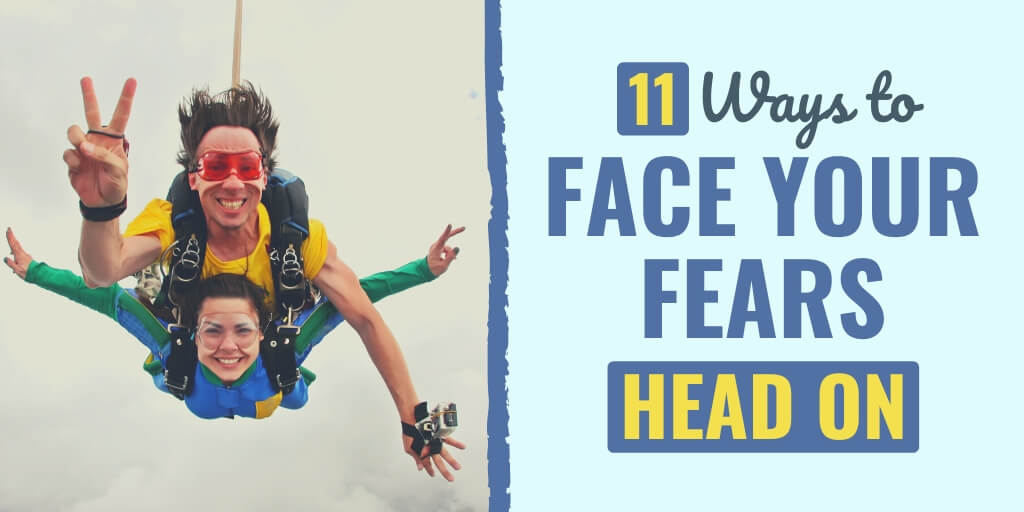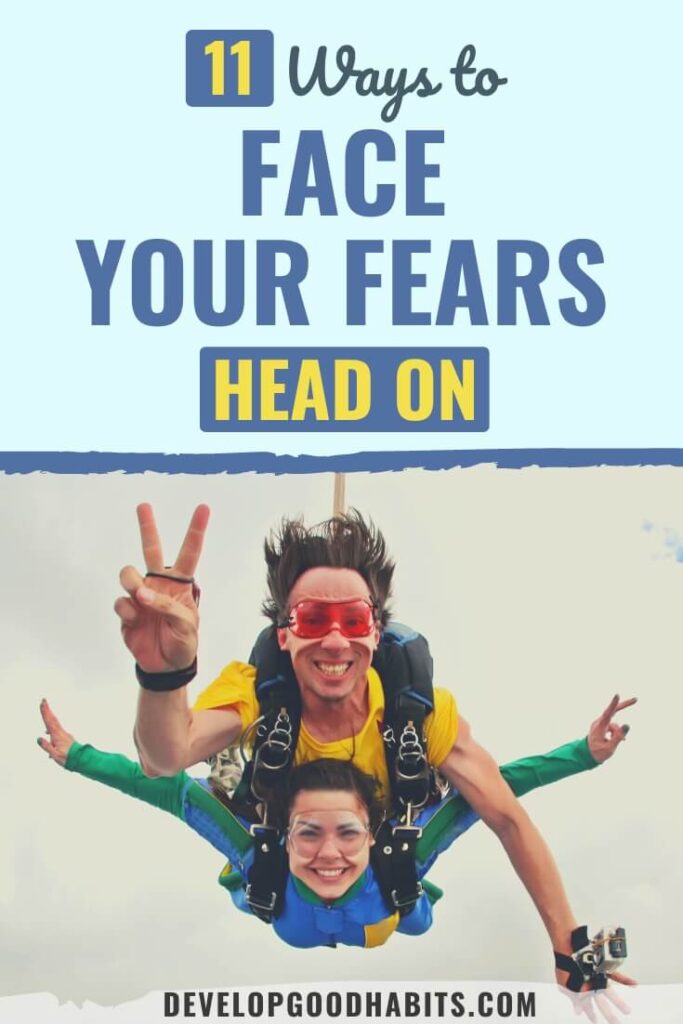There might be affiliate links on this page, which means we get a small commission of anything you buy. As an Amazon Associate we earn from qualifying purchases. Please do your own research before making any online purchase.
The world can be a scary place, and being able to face your fears head on is one of the most vital life skills to have.
It may seem that some people are inherently brave and easily shrug off a worry or fear, but being bulletproof to fear is not something you are born with… nor is it a secret link in your DNA.
Being able to face your fears is a skill you learn by (you guessed it) facing your fears.
Of course, it’s not saying that you should throw yourself at fear through reckless behavior. Instead, there are methods and techniques that can help you face fear when it arises and come out on the other side courageous. After all, there’s no courage without fear, right?
Here are my top fear-facing techniques and tips to help you face the fear monster before it strikes you down.
What Is Fear?
Before you begin planning your battle strategy against fear, it’s important to know your “enemy.”
So, what is fear?
Fear is the threat of something or the possibility of something unpleasant happening. It’s imagination in action in the worst possible way. Fear starts in reality (I see a lion) and ends in what we anticipate will happen (the lion will chase and eat me).
Of course, to make matters worse, fear combined with imagination can drum up the most horrific versions of the actual threat in your mind.

Where you feared a rat in your kitchen or your boss’s reaction when you arrive late for work (the actual fear trigger), you end up imagining the worst possible outcome (the rat spreads disease, and you die horribly, and your boss fires you after a public humiliation you endure).
This all means that fear is actually your imagination turning against you, manipulating your survival instincts to overreact and cause you anxiety. What you fear usually never happens.
Mark Twain said, “I've had a lot of worries in my life, most of which never happened.” Your fear is not a concrete fact or predetermined event—it’s something that hasn’t happened (but you fear it will).
Why Is It Important to Face Your Fears?
No one likes to be scared or have fears. It makes you anxious and stressed, none of which is good for your health.
One of the biggest benefits of not being afraid is exactly that – you no longer have that fear.
There are other reasons why it’s important to face your fears. Here are the main ones.
Overcoming your fear helps:
The Benefit of Having Fears
Of course, there is a healthy level of fear that is good for you. Everyone should have some dose of fear because it:
11 Ways to Face Your Fears Head On
Even though a healthy dose of fear is good, too much fear can paralyze or incapacitate you and hold you back from living life to the fullest and reaching your full potential.
You may think that avoiding what you are afraid of is one of the best ways to deal with it. Maybe you even think that your fear will go away – eventually. Wrong.
Avoiding or running away from your fears is just a temporary band-aid fix; it doesn’t solve the underlying problem and your fear will never go away.
Hacking fear can be scary, but putting in the hard work and following these tips will help you overcome your fear.
And as the wizard in The Wizard of Oz says, “Not having fear isn’t brave; it’s foolhardy. Any real hero knows fear … The real difference is a hero masters his fear.”
Here are the 11 best ways to face your fear:
1. Accept Your Fear
The first step to overcoming anything is to accept and acknowledge. Own that you have fears (you are human, and it’s more than okay to not be perfect).
It is quite empowering to practice acceptance, and you’ll realize how exhausting it is to avoid or pretend that your fear doesn’t exist.
But I get why it’s challenging to acknowledge that you are afraid – most of the stories you see on social media platforms are about the “perfect” lives of others or how easily they overcame fear, anxiety, trauma, and addiction.
Do you feel like a failure because you are struggling with your fears and even just to say that you are afraid of failure, that you are afraid of taking a chance and changing your career, or that you are afraid of flying on an airplane?
People don’t lead happy, positive lives like they have you believe. Everyone struggles. And everyone has some kind of fear.
Use this knowledge to help you accept your fears so you can take the next step in facing your fear.
2. Identify Your Fear
Once you have accepted that you have a fear (or two), it’s time to identify what the fear is. Maybe you are afraid of public speaking, or perhaps you are scared of commitment or being alone?
Take the time to be honest with yourself about what it is that you are afraid of. Make a list and rank your fears from the least frightening to the most frightening.
You’ll use this to help you overcome your fears as you’ll start with the least scary fears and work your way up the list. As you conquer each fear, you’ll feel brave and motivated enough to face the next one.
3. Find the “Why” of Your Fear
It’s essential to dive deep and find out why you are afraid of whatever it is you are afraid of. Knowing the reason can help you overcome that fear.

Be an emotional scientist to find the source of your fear. Become self-aware and try to figure out when this fear started and what triggered it.
4. Learn about Your Fear
The next step is to learn more about your fear. Sometimes, you are simply scared because you don’t know much about whatever it is you are afraid of (aka a fear of the unknown), or perhaps you believe myths about the scary thing (that aren’t even real or true).
Learning more about what you fear can help you overcome it. You may realize how “silly” your fear is, or you may realize that the risks you perceive aren't as great as you think.
For example, you may be scared of snakes and dying via a painful, venomous bite. I get it. Snakes are scary creatures. According to the CDC, between 7,000 to 8,000 Americans are bitten by venomous snakes every year, and only about 5 of those don’t make it.
But if you are at risk for cancer or heart disease, you have a higher chance of dying from those diseases than a snake bite. In fact, heart disease kills almost 700,000 people in the U.S. each year, with cancer taking just more than 600,000 (CDC).
To help you face your fear of snakes and venomous bites, you can learn more about what to do should a snake bite you, what snakes are venomous, and so on.
5. Create an Action Plan
Now it’s time to put a plan of action together. You want to be methodological in your planning and remember to take it one baby step at a time. If you rush into overcoming your fear, it could backfire, and you may feel more stressed and scared than you were before.
When you create your action plan, use the fear hierarchy with small, actionable steps. For example, if you are scared of public speaking, your action plan may look like this:
6. Slowly Expose Yourself to Your Fear
You have your plan of action, so you need to act on it now. With the steps you’ve outlined, you can start to slowly and gradually expose yourself to your fear.
Starting small by exposing yourself to the least scary situations helps you feel less anxious when it’s time for the next (slightly scarier) step.
Essentially, you build confidence and courage with each step that you succeed at. And with rinse and repeat, you’ll soon have worked your way through your plan to face your fear.
7. Manage the Stress and Anxiety that Comes with Your Fear
An essential step to overcoming fear is managing the stress and anxiety you feel. The action plan will go a long way to helping you, but fear-based thinking isn’t easy to control.
Start becoming more mindful, practice deep breathing, meditate, exercise, get enough sleep, and eat healthy foods to bring your stress levels down.
You can also adopt the power pose (#WonderWoman or #Superman) to feel calmer and more confident.
8. Think about the Benefit to Overcoming Your Fear
Thinking about the benefits you have to gain will help you face your fear and also help manage your stress and anxiety.
Make a list of the benefits when you conquer your fear. It could be that facing your fears helps you grow (and develop a growth mindset) to become a person who sees abundance and who isn’t afraid of action, change, failure, and success.
You may even benefit from a promotion at work if you can conquer your fear of flying and go on that all-important business trip.
9. Get Comfortable with Being Uncomfortable
Whenever you want to face fear, you need to get comfortable with being uncomfortable because being scared and putting your fear-overcoming action plan in motion will make you uncomfortable.
Facing your fears means you need to step outside your comfort zone, take risks, and see opportunity. Before you start overcoming your fears, start trying new things first.
Make a list of things you can try – like going to that public speaking class that your coworkers rave about, asking out the interesting person you have your eye on, eating at an exotic restaurant, or going for a rebounding class.
The more you get comfortable with the uncomfortable, the easier it is to push out of your self-limitations and face your fears.
10. Imagine the Worst
When you are on the journey of overcoming your fears, it’s a good idea to actually imagine the worst thing that can happen. Be mindful when you think about the worst-case scenario and write it down.

Now, take a mental step back. Go make some tea, do some online shopping, or go for a walk. Come back to the worst-case scenario and look at it with fresh eyes.
Is your scenario plausible and realistic? What evidence is there that makes this scenario possible or likely to happen?
Do some research to help you dispel this scenario and put your fears at rest.
11. Sharing Is Caring
It sometimes helps to talk about our fears because they seem a lot less scary then. You may not have a family member or friend whom you trust enough to share your fears with, and that’s okay.
Luckily, there are other resources at your disposal. Call:
Final Thoughts on How to Face Your Fears
It’s brave that you are here and that you want to face your fears. Know that you aren’t alone in feeling afraid or in wanting to conquer your fears.
Following the steps I’ve outlined will help you, but you need to take it slow, breathe, and persevere.
An essential note: If you suffer from chronic fear, if your fear is related to a mental health condition, or if trying out these strategies on your own isn’t helping, then I recommend that you seek out a licensed healthcare professional to help you with coping strategies and to conquer your fear.
Or for a more light-hearted read, check out these songs to help you overcome fear and anxiety. With Kelly Clarkson’s Invincible, you’ll be ready to say no to fear and feel more confident.
And if you're looking for articles regarding facing fear, be sure to check out these blog posts:
- How to Overcome Your Fear of Success: 7 Steps
- 11 Fear of Missing Out Examples from the Real-World
- 74 Fear Quotes for When You're Scared of the Unknown
Finally, if you need help with building habits, then check out this nine-step blueprint that walks you through the entire process of creating lifelong habits.)


